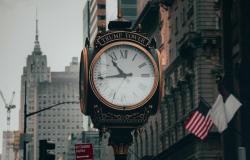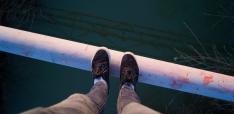What did you do during the Trump Times?

Jessica DiCarlo and Seth Schindler explore how foreign policy professionals should respond to Trump.
Mohsen Mahdawi, a Columbia University philosophy major on the cusp of U.S. citizenship, arrived at a Vermont immigration office this spring expecting a routine interview. Instead, masked ICE agents whisked him into unmarked vehicles—his offense: participating in peaceful demonstrations against Israel’s ongoing assault on Gaza. This is not an isolated occurrence. In recent weeks, dozens of students and recent graduates have been detained by ICE agents in similar incidents. Some are held without being charged, others are summarily deported to their home countries, and still others are transferred thousands of miles to detention centers. Most alarmingly, some individuals have been disappeared into a mega-prison in El Salvador without due process and in flagrant defiance of court orders. Barely more than a hundred days into Trump’s second term, and the US is on its way to becoming a police state.
If Americans manage to pull back from the brink of authoritarianism, there will come a time when everyone will be asked: “What did you do during the Trump times?” The question may be posed by a child or grandchild who is currently too young to understand the extraordinary events that animate countless news cycles. The question is likely to be asked over and over to Americans abroad, by strangers who struggle to understand how US institutions that historically served as a bulwark against tyranny became so brittle. For academics and policy professionals, that question is no longer hypothetical. Educators can be sure that this question will be asked by their students. Scholars who have made a career researching and teaching about US foreign policy should be prepared for difficult conversations.
The US is not a ‘normal’ superpower
Open most think‑tank reports or publications such as Foreign Affairs, and you will likely find sober advice from well-respected commentators on how Washington can “maintain its edge” over China. However, the drift towards authoritarianism in the US calls for urgent reflection; such commentators should ask themselves whether it is appropriate to offer advice that could bolster US power, if the Trump administration uses it to threaten Greenland, bully Canada, and undermine Ukraine.
Kurt Campbell and Rush Doshi sketched a strategy for preserving US primacy: weld together a “mega‑bloc” of allies and integrate their industrial bases. After a review great power competition, they suggest that the US strategy towards China is based on the faulty assessment that the US can go it alone. Although the US once displaced Great Britain as the leading superpower by leveraging its economic scale, today, they assert, the US can avoid a similar fate by “harnessing allied and partner scale in new ways.” Their proposed coalition—Australia, Canada, India, Japan, Korea, Mexico, New Zealand, and the European Union—would integrate industrial capacity and economic activity to dwarf the scale of China’s economy. “Unlocking the potential of this coalition,” they conclude, “should be the central task of American statecraft in this century.”
This prescription assumes that such partners would sign on and that augmenting US power abroad is an unalloyed global good. Neither premise can be taken for granted. America’s allies are already balking at Trump’s trade tantrums. After an unproductive meeting between US and EU trade negotiators, one EU official stated bluntly that “[t]he transatlantic alliance is over.” Even if such a coalition were feasible, would it be desirable? Ukrainian President Volodymyr Zelensky made the point in an interview with 60 Minutes that “Russian narratives are prevailing in the US.” Currently, strengthening the US risks furthering Russia’s agenda.
Worse, this genre of grand strategy fails to account for the fundamental changes to American policy over the past three months and treats Trump’s America as a rules‑bound superpower. While acknowledging Trump’s unpredictability is de rigueur, it is often represented as style while the US Government remains a rational actor. Cold War historian Sergey Radchenko, for instance, offers advice to the US and China for avoiding a new Cold War. While the objective is admirable, his analysis is anachronistic. He urges Beijing to “signal to Washington, in public or through private channels, that China does not plan to invade Taiwan in the foreseeable future.” This assumes continued US commitment to Taiwan’s security, yet as Kyiv’s experience shows, “alliance” has become an old-fashioned word in Washington these days. Rather than demonstrating resolve to protect Taiwan, Trump is more likely to treat Taiwan as a bargaining chip to be traded if offered the right deal.
The US has a long history of dealing with autocrats, but its compromises were typically portrayed as beneficial to the greater good. According to Hal Brands, “morally troubling work” during the Cold War such as supporting coups against democratically elected leaders who were too friendly to the Soviets, was a small price to pay for avoiding a great power war. He asserts that to counter China, the US may have to resort to “some of the same sharp-edged tools, from economic coercion to covert intervention, that it deployed in the Cold War.” Hard-nosed realpolitik was easier to justify when the US could claim to uphold a “rules-based international order,” but it is far more difficult to rationalize when it animates the construction of a 21st-century gulag archipelago in Central America. Yet in chilling political theatre, Trump heaped praise on El Salvador’s strongman Nayib Bukele in the Oval Office, and said he supports the idea of building out the Central American country’s mega-prison to house more deportees. Bukele is the self-proclaimed “world’s coolest dictator,” and famous for packing 40,000 alleged gang members into his new Terrorism Confinement Center—an iron‑gray complex and the largest prison in the Americas. He sat grinning beneath Andrew Jackson’s portrait, and the message was unmistakable: Washington is open for illiberal business, and the president is eager to franchise the Bukele brand of “order.” Political opponents, beware.
Where should foreign‑policy specialists invest their expertise?
Many foreign policy experts have spent time working for the US Government, so, understandably, their instinct is to support its long-term objectives. But the values that historically made people pursue careers in public service do not animate US policy at home or abroad. In short, as domestic institutions warp under executive pressure it is untenable to treat the US as a rational, rules-bound actor. What can foreign policy specialists do?
First, not all institutions have acquiesced to the Trump administration. Hopefully, more universities, foundations, municipal governments, and think tanks take Harvard University’s lead and refuse its unreasonable and unlawful demands. For those encouraged by their institutions to crank out business-as-usual commentary that uncritically supports US foreign policy, now is a good time to update their résumés.
Second, rather than offering blueprints for maintaining US power, experts can offer advice to erstwhile US allies whose values they share. How can Japan convince Trump to rescind tariffs, or at least minimize their impacts? How should the incoming Canadian government respond to Trump’s bullying? What can Ukraine do to end the war on favourable terms in the context of Washington’s rapprochement with Moscow? Foreign policy experts are well-positioned to offer innovative answers to these questions. Those who have worked in the US Government know better than anyone the limits to American power, and their advice should help the world’s beleaguered democracies take advantage of US weaknesses.
Finally, authoritarian drift is no longer an abstract risk—it is becoming a reality that, in the coming years, if not months, many people will encounter in everyday life. New workplace guidelines, measures to identify undocumented individuals, and other seemingly mundane rules are today’s frontline. The Stockholm City Council simply rejected the US Government’s demand that it abandon its commitment to diversity, but for those based in the US, resistance will be far more challenging. James Scott’s Weapons of the Weak observed that peasants rarely stage open rebellions. Instead, they erode power through “foot‑dragging, false compliance, pilfering, slander, arson, sabotage.” Scott reminds us that the seemingly powerless are never so; they can act subtly and to great effect. In an America where open protest can invite surveillance, deportation, or prosecution, everyday resistance must be treated not as a last resort but as the first line of defence.
The first hundred days of the Trump administration were dizzying, yet cracks in his administration’s agenda are already visible. The tariff barrage announced on “Liberation Day” was pitched as a shortcut to revived factories and permanent tax cuts. It will almost certainly do neither, and it may lead to inflation and even recession. If voters trim the president’s congressional majority in 2026 and replace him in 2028, historians will brand this era a near‑miss—a cautionary tale of how the US skidded dangerously toward authoritarianism. That verdict, however, is not pre‑written, and it is frighteningly plausible that Trump continues to centralize power and erode checks and balances. What we do now will resonate far beyond the next election cycle, and those who draft blueprints to shore up American primacy and treat the US as just another great power to be fine‑tuned will be remembered as enablers. But if they use their platforms to strengthen open societies—from Vermont to Vilnius—they may have an answer worth giving when someone asks, “What did you do during the Trump times?”
Jessica DiCarlo is a geographer and Assistant Professor at the University of Utah, with expertise in China, development, geopolitics, and environmental politics. She co-founded the Second Cold War Observatory.
Seth Schindler is Professor of Urban Politics & Development at the University of Manchester, and co-founder of the Second Cold War Observatory.
Photo by Alex Hoces


